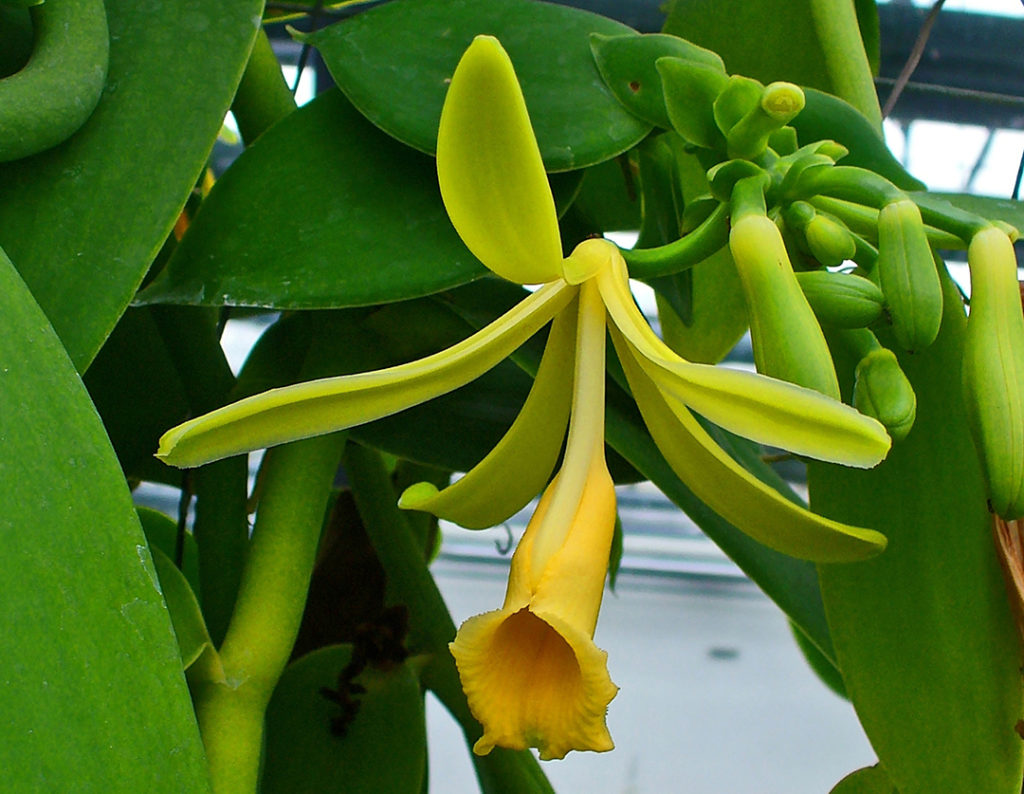
Comoros
Vanilla
Vanilla planifolia

General Description / Cultural Significance
On the volcanic islands of Comoros, many plants and trees grow that provide essential oils for perfumes. Vanilla, or Vanilla planifolia, is one of them. Vanilla production is very important to the economy and to individual farmers. At least 70% of the working population active in Comoros’s rural areas is involved in vanilla production. This has put Comoros on the list of the top ten countries in the world in vanilla bean production. It is tradition in Comoros that the women fertilize the flowers of vanilla orchids. Ylang-ylang, clove, rose and coconut are also cash crops.
Vanilla is a well-known flavoring. When the pods are ripe, their fragrance smells like caramel and ripe fruit. It is used in food to sweeten it and reduce the need for sugar, and is also used in many syrups. In Comoros vanilla is also used to flavor poultry, fish, and sea food dishes. The plant is used frequently in perfumes, and is known to be an aphrodisiac, as its aroma and flavor evoke feelings of warmth and comfort.
Climate Change/Conservation Status
Because a network of protected areas have been established, protected by the local villages themselves, preservation of biodiversity and natural resources is high. Nearly 90% of the population works in subsistence agriculture with the majority of the production consumed by themselves. In 2011 the country produced 50 tons of vanilla after recovering from forest fires that devastated the most productive plantations.
Vanilla planifolia in Comoros is considered an endangered species by the IUCN Red List of Threatened Species. Even though they can still be found throughout the island, their population is thin and highly fragmented. Their habitat is continuing to be reduced because of agriculture and cattle grazing. The plants are often collected legally and illegally for many different reasons including genetic modification and export.
Comoros sees the environment as inseparable from the success of their agriculture and quality of life, but also as imperative to its growing tourism, so environmental protection is a high priority. Kerosene is subsidized to minimize tree cutting for fuel. Restoration of forests lost to the effects of ylang-ylang distillation has been a priority.
However, Comoros is vulnerable to many of the effects of climate change. Rising sea levels, storm surges and coastal erosion is already a huge concern because 100% of the population lives within 10 kilometers of the coastline. This means their villages and the country’s infrastructure too are being affected. Recently, a reduction in annual rainfall has been observed. Solar energy is now a focus along with other national efforts to address climate change.
Alternate Names
Common vanilla
Sources
Burton, J., 2018. The Leading Countries In Vanilla Production In The World. World Atlas. [website]
McSweeney, C., New, M., & Lizcano, G., n.d. Comoros. UNDP Climate Change Country Profiles. [website]
UNECA, 2014. Addressing climate change in Comoros and Sao Tome and Principe. United Nations Economic Commission for Africa. [website]
“Union of the Comoros”. Union Des Comores. (2009).
Vega, M., et. al., 2017. Vanilla planifolia. The IUCN Red List of Threatened Species. [website] DOI: 10.2305/IUCN.UK.2017-3.RLTS.T103090930A103090933.en

